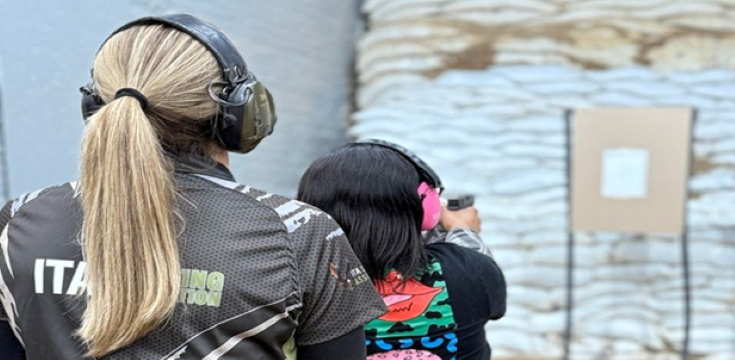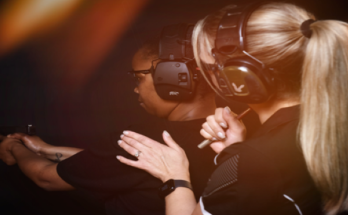As firearm ownership among South African women continues to rise, the gap in female representation within the training sector remains striking—less than 15% of the country’s certified firearm instructors are women, according to ITA CEO Nikki Pretorius. Research shows that women often learn more confidently and engage more openly when guided by instructors who share their lived experience.
This holds across many industries, including firearms training, where creating safe, relatable, and empowering learning environments is crucial. In this Q&A, Pretorius discusses why increasing female representation matters and how the industry can better support women seeking skills for protection, confidence, and empowerment.
1. Why was it important for ITA to launch a female-centric programme like Women Who Train?
Over the past several years, our industry has experienced a noticeable evolution in the profile of learners who come to us for firearm-competency training, particularly for licensing purposes. Two significant trends have emerged:
1st Trend: A growing number of women are enrolling for basic firearm-competency training.
Where firearm training was once seen as a predominantly male domain, we are now seeing more women taking active steps toward responsible firearm ownership. Many are seeking competency for personal protection, professional development, sport shooting, and hunting, or simply to build confidence and skill. This shift has broadened the demographic of our learner base and highlighted the importance of creating a training environment that supports new female shooters.
2nd Trend: More women are entering our industry in administrative and operational roles. The firearm-training sector is highly regulated and, by necessity, highly administrative. Training providers must manage extensive documentation, maintain compliance records, build portfolios of evidence, and handle complex interactions with clients and regulatory bodies. As the demand for professional, organised, client-focused administration has grown, many centres have brought women onto their teams to fulfil these vital roles.
Once working within the environment, however, many of these women begin to develop a genuine interest in the training side of the industry. Firearms and the training culture have a way of “getting under your skin,” and for women to advance into higher-level positions such as assessors, facilitators, or senior training staff, they must meet a specific standard of firearm knowledge and practical skill.
This is where the need for female-centric firearm instructor training first became clear: women working within our own training centres required upskilling to progress in their careers. Their involvement in administrative functions has given them insight into the training process, compliance, and client needs, but to step into instructional or assessment roles, they need practical firearm competency at a higher level.
The combination of more female learners and more women joining the industry workforce has therefore driven us to recognise and prioritise the upskilling of women across all levels of our sector. This evolution is not only reshaping the demographic landscape of firearm training but also strengthening the professionalism, inclusivity, and capability of the industry as a whole
2. What impact do you believe female representation has on the confidence and comfort of women entering firearm training?
Women often feel more comfortable and confident when they learn from another woman, especially in a space that’s usually male-dominated, like firearm training. It takes away a lot of the intimidation. They know they won’t be judged for asking basic questions, and they can learn at their own pace without feeling rushed. A female instructor also understands the concerns many women bring into these classes, so the whole environment feels more welcoming and supportive. And honestly, seeing another woman leading the way sends a powerful message: you belong here, and you can be great at this.
3. With less than 15% of certified firearm instructors being women, what barriers do you see preventing more women from entering this field?
There are definitely barriers that can make it harder for women to enter the firearms-instructor space, but everyone’s experience is different. In my case, I actually entered the industry under quite unusual circumstances, inheriting the business from my husband. And I have to say, the men in the industry those part of the ITA network were incredibly supportive during that transition.
They took my upskilling very seriously, they shared their knowledge openly, and they created an environment where I could grow quickly. I’m genuinely grateful for that. I’ve always enjoyed working in a male-dominated environment, but I’m very aware that not all women have the same experience or the same support system when they first step into this world.
Even with that support, I still had my own challenges. Equipment wasn’t made for my body, so something as simple as finding gear that fit properly was a barrier I had to overcome. And I dealt with my own imposter syndrome. I worked hard, incredibly hard. I had a driving need to over-achieve to prove to myself and my industry that I belonged in this space.
Today, even as the largest lead service provider in the firearms-training industry, I don’t always receive the same level of respect that men with far fewer qualifications or less experience are given particularly by those who don’t know me. That’s a reality a lot of women face, no matter their skill level.
For women coming into the industry without the support network I had, the barriers can feel even bigger. Intimidation is a major issue for many women who walk into their first course or certification feeling like they have to prove themselves immediately. There can also be concerns about boundary issues or uncomfortable interactions.
It’s not unique to firearms; every industry has a few less-than-professional operators, and that can make newcomers cautious. On top of that, social conditioning and self-doubt play a role. Women are often taught, subtly or not, that firearms are ‘a man’s domain,’ and that can create hesitation about stepping into an instructor role.
Another very real barrier is access to training resources. Ammunition and range time are expensive, and the cost adds up quickly, especially when you’re trying to train at an instructor level. That’s one of the reasons we built this programme the way we did: to remove that financial barrier. We want women to have the space, time, and resources to train properly without the pressure of high ammunition and training costs holding them back.
So, while I’ve personally had a very supportive experience, I also recognise that many women face cultural, financial, and psychological barriers on their way in. That’s why representation, mentorship, and accessible training opportunities matter; they make the path easier for the women who follow.
4. How does having more female instructors help reshape perceptions of a traditionally male-dominated industry?
Having more female instructors really helps shift the perception of the firearms world as ‘a man’s space.’ When women see someone who looks like them confidently teaching on the range—whether it’s technical skills, safety, or mindset it immediately signals that they belong here too. I know from my own journey that representation matters.
Even though I entered the industry under very unique circumstances and had the support of incredibly dedicated men who invested in upskilling me, many women don’t have that same starting point. When female instructors are visible, approachable, and skilled, it breaks down intimidation, challenges old assumptions, and makes the industry feel more inclusive. It shows that competence isn’t defined by gender—and that’s how perceptions start to change.
5. In what ways can female-led training environments create safer and more supportive spaces for new women shooters?
Female-led training environments create safer and more supportive spaces for new women shooters because they tap into something women have always naturally gravitated toward: having their own spaces to learn, connect, and just be themselves. For decades, women have formed their own book clubs, stokvels, walking groups, prayer circles, you name it. Not because they don’t love the men in their lives, but because women sometimes need a space where they can relax, ask questions freely, and let their guard down without feeling judged.
Firearm training is no different. When a woman walks into a class led by another woman, so many barriers fall away. The intimidation drops, the fear of being talked over or underestimated disappears, and suddenly there’s room for open conversation, honest mistakes, and real confidence-building.
6. Why is it vital for the firearms industry to reflect the growing number of women choosing to own and train with firearms?
The firearms industry needs to reflect the growing number of women who are choosing to own and train with firearms because the industry must evolve to meet the changing reality of its customer base and community. Our country and industry are at a point where transformation isn’t just a nice-to-have—it’s essential for relevance, safety, and growth. Women bring different perspectives, needs, and experiences that must be acknowledged and supported for the industry to thrive.
That said, this programme isn’t about ticking boxes or meeting quotas. It’s about answering a real need—providing women with the opportunity to be trained by other women who truly understand their journey. It’s also about upskilling women who have already broken through barriers and hit their ceilings in this industry but want to grow, lead, and take their careers to the next level. This isn’t symbolic; it’s practical, intentional, and necessary for the future health of firearms training and safe and responsible ownership in our country.
7. How do mentorship and representation influence a woman’s willingness to ask questions, engage, and continue her training journey?
Mentorship and representation are crucial in helping women feel confident enough to ask questions, engage fully, and stay committed to their training journey. Speaking from my own experience, I couldn’t have succeeded in the firearms industry without the mentorship and coaching I received from the men around me. They took my development seriously and helped me build the technical skills and confidence I needed to take on the role that stood before me.
But there came a point where I needed something different, female-centric mentorship and coaching that addressed experiences and challenges only another woman could truly understand. That kind of support helped me work through imposter syndrome, boundary issues, and the subtle social pressures unique to women in a male-dominated field.
Because I know how vital this is, I’ve brought my personal business coach, a woman with deep experience in female leadership, into this program to support our candidate instructors. It’s about more than just technical skills; it’s about fostering resilience, leadership, and confidence in a way that speaks directly to the unique journey women take in this industry
8. What unique strengths do women bring to firearms instruction and leadership within this field?
One of the unique strengths women bring to firearms instruction is a remarkable willingness to learn. I often see women outperforming their male counterparts because they listen carefully to instructions without the interference of ego or unrealistic expectations to ‘be the man’ in the room. This humility and openness allow them to absorb skills faster, whether it’s aligning sights or managing recoil. I’m not saying men don’t have their own challenges; everyone does, but when focusing on women in this program, this openness is a clear advantage.
Women are also generally more comfortable sharing their personal experiences, even if it means being vulnerable. This vulnerability builds a connection not only between instructor and learner but also among learners themselves, creating a safe space where people feel free to share similar concerns, ask questions, and support each other.
Other strengths include strong communication skills, empathy, and collaboration. Women often prioritize creating supportive learning environments where feedback is constructive and encouragement is consistent. This helps reduce intimidation and makes the learning process more effective and enjoyable.
These qualities combined don’t just make for better shooters; they cultivate leaders and instructors who can transform the culture of firearms training into one that is inclusive, empowering, and effective.
9. How does the Women Who Train programme open pathways for entrepreneurship among South African women?
The Women Who Train programme is designed to open clear pathways for entrepreneurship among South African women in the firearms industry. ITA has trained thousands of firearms instructors over the past two decades, and our program is unrivalled in both quality and reach. Beyond training, we support new training providers in successfully applying for accreditation both with the quality assurer and with the SAPS.
This dual expertise, combined with a deep understanding of what it takes for women to earn and maintain respect in a male-dominated industry, positions us uniquely to help female instructors transition from qualification to business ownership. The programme doesn’t just equip women with technical and instructional skills; it also provides the guidance, mentorship, and connections they need to launch and grow their own training businesses.
Regular calls from our network of training providers seeking qualified female instructors further ensure that these women have immediate opportunities to establish themselves and thrive as entrepreneurs in this space.
10. What broader societal impact do you hope this initiative will have, especially in a country facing high levels of gender-based violence?
Firearms and gender-based violence are both very sensitive issues, and I’m certainly not advocating that women rush out to license a firearm as a knee-jerk reaction to GBV. What I am saying is that anyone, particularly women who feel vulnerable, including single mothers, should feel empowered to acquire the skills necessary to safely, confidently, and lawfully use a firearm if they ever need to protect themselves or their families.
The broader societal impact we hope for is creating an environment where women feel confident, competent, and prepared, without fear or hesitation. By providing training through ITA-approved providers, we ensure that women can walk into a training environment that is professional, supportive, and fully focused on responsible firearm use. It’s about equipping women with skills and confidence, not encouraging knee-jerk reactions, and creating a culture of safety and competence across the country.
11. What message do you have for women who may feel intimidated or unsure about stepping into firearm training or instruction?
Someone I really respect in the industry came to see me today, and in conversation, he reminded me that we are never finished writing our stories. It reminded me that the story of our lives is made up of a culmination of choices, and if this feels like the next chapter in the book of your life, now is the time to act.
This opportunity is rare, so if you’ve ever considered stepping into firearm training or instruction, I would say: don’t wait. Take that step, embrace the challenge, and write your next chapter with confidence and purpose, and with the support of an experienced group of people to help guide your journey.
12. How do you envision the future of firearm education in South Africa as more women become certified instructors?
I envision a cascading effect as more women become certified firearms instructors. When women see other women teaching, it makes them feel more comfortable stepping into firearm training themselves. That confidence spills over into other areas: more women will join their male counterparts on hunting trips, explore the competitiveness of sport shooting across its many disciplines, and consider career paths they might previously have felt intimidated by, such as police officers, security officers, gunsmiths, arsenal controllers, or firearm retail.
Essentially, female instructors don’t just teach skills; they help normalize women’s participation across the entire firearms ecosystem, opening doors that were previously perceived as too daunting. Women nationwide, from beginners to experienced shooters or those who have an interest in firearms, training, and safety, are encouraged to apply for one of the six positions here between 19 November to 20 January 2025.




